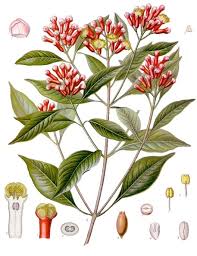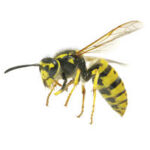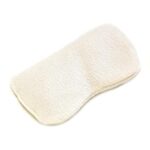Clove trees are cultivated throughout the tropics and the dried flower buds are used to spice foods. A potent essential oil is distilled from the buds, which is highly antiseptic and analgesic. You can use clove oil to treat toothache, but you should always use it with caution. It can, even in low concentrations, irritate the skin and mucous membranes.

Beneficial vapours
You can best benefit from clove oil's infection-fighting properties by using it in a steam inhalation rather than in massage blend. Clove vapours also ease breathing and digestive disorders.
Clove strengthens the memory and, blended with rosemary, it enhances concentration and lifts depression. It is also a good insect repellent and, combined with lemon and eucalyptus oils, it can deter mosquitoes.
Active Ingredients of Clove Oil
The principle component of clove is eugenol, a phenol. This makes up between 80-90% of the oil and provides its characteristic spicy odour.
Phenols
Phenols are very reactive compounds. They act as stimulants to the nervous system and are highly antiseptic and anti-bacterial. Phenols are also caustic, however. They can cause irritation to the skin and mucous membrane and can be toxic to the liver.
Uses of Clove Oil
Clove oil can be used to repel unwanted insect visitors and to cleanse your home. It is a valuable addition to blends used to fight infections and can also ease toothache.
Cleanse your Home with Clove
The scent of clove oil brings a pleasant, spicy aroma into your home, while also cleansing and fumigating the area.
Refresh and deodorise carpets
For an antiseptic and fragrant blend of aromatherapy oils, blend:
10 drops clove oil
20 drops each of orange and lavender oil
10oz bicarbonate of soda
Pour into a polythene bag, seal and shake. Leave to infuse for 24 hours before sprinkling on carpets. Then, leave for an hour before vacuuming the room.
Repel Summer Insects

Impregnate lengths of ribbon with 2-3 drops each of clove, lemon and lavender oils.
Hang in an open window.
Festive winter room scent
Arrange pine cones in a bowl and add:
2-3 drops clove oil
2-3 drops cinnamon oil
8 drops tangerine oil
8 drops mandarin oil
Fight Infections
Clove's natural anti-spasmodic and expectorant actions make it useful to use in the fight against winter chills, colds and digestive problems.
When suffering from a cold or flu, fumigate the house with this blend to prevent the spread of infection: Add 2 drops each of clove and cinnamon oils and 10 drops of orange oil to 40ml of water. Spray around the room to purify the air.
To combat diarrhoea, place a warm compress on the abdomen using a flannel soaked in hot water, containing 2-3 drops each of clove, ginger and peppermint oils. The clove will kill germs and give pain relief, while ginger and peppermint will help to settle the digestion.
Improve Dental Health
Clove's antiseptic, anaesthetic effects make it a valuable dental oil, though overuse can cause gum disease.
For severe toothache
Make a hot compress by soaking a flannel in hot water containing:
1 drop clove oil
3 drops chamomile oil
3 drops lemon oil

Combat bad breath
For an antiseptic mouthwash, blend:
2 drops clove oil
5 drops tea tree oil
4 drops thyme oil
10ml vodka
Add 200ml distilled water and shake. Use as a mouthwash twice a day, but remember not to swallow.
Folklore of Clove
Clove has been a valuable spice for centuries, traded across Asia and Europe. In addition to its use as a medicine and food spice, it was associated with spiritual cleanliness.
In ancient India, pungent love potions were made from cloves and given to newly wed couples.
On the Molucca Islands, the native home of cloves, children wear necklaces of clove seeds to protect them from illness and evil spirits.
Ancient Chinese texts state that any courtier or official addressing the emperor was required to have a clove in their mouth to ensure that their breath was not offensive to their master.
During the 2nd century AD, camels carried sacks of cloves on the caravans trade route from China to Europe.